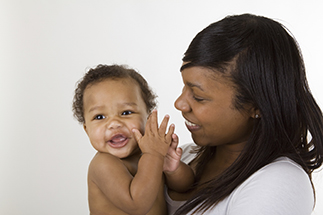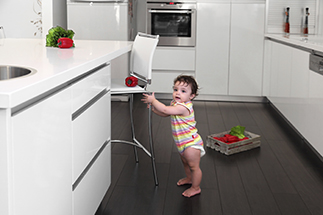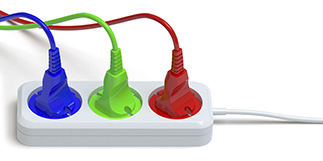Home safety
Helpful ideas for keeping your home safe
 Most accidents occur at home and over half involve children under the age of 5. Here are just a few suggestions of ways to improve home safety. Less than 1% of children deaths in Kenya. For children between ages 4-9 the figure rises to nearly 4%. Just bear in mind that a young child explores with their mouth, is unable to distinguish between good and bad odours, and will swallow even foul tasting substances. This makes children under the age of 4 the ones most exposed to household dangers.
Most accidents occur at home and over half involve children under the age of 5. Here are just a few suggestions of ways to improve home safety. Less than 1% of children deaths in Kenya. For children between ages 4-9 the figure rises to nearly 4%. Just bear in mind that a young child explores with their mouth, is unable to distinguish between good and bad odours, and will swallow even foul tasting substances. This makes children under the age of 4 the ones most exposed to household dangers.
On the stairs
- Fit stair gates at the top and bottom of the stairs.
- Always open gates yourself and never climb over them, little ones love to copy us – so be careful, otherwise “Monkey see monkey do”.
- Vertical posts on the gate should not be more than 10 cm apart.
- Ensure toys and clothes are not left on the stairs for someone to trip over.
- Teach your baby to come down the stairs backwards on their tummy. They should also be encouraged to crawl up the stairs (until about 3 years of age) to prevent them from toppling.
Medicines, poisons and chemicals
- Be alert! You must know which products in your home are poisonous or dangerous. Attractively packaged products that look harmless and are used in and around the home can be dangerous when swallowed by a child. Often such products are not labelled as poisonous and contain only the word "Caution" as warning. Remember, small children cannot read warnings.
- Poisoning does not always occur from the conventional chemicals like bleach and washing liquid etc., but from more common household items. Nail polish remover, deodorant, make-up, vitamins, essential oils, bubble bath and alcohol are all potentially harmful to your child.
- Don’t pretend that medicine is a sweet or a drink, and always keep it in its clearly labelled bottle or container. Dispose of any old or out-dated medicine. Keep the ones in use well out of reach of your little explorer.
- Ensure all potentially harmful substances are kept in a secure cupboard well out of reach of children. Lock up all medicines and potentially dangerous household products. Even a high shelf is not safe. Don’t forget that children are curious and persistent. And they can climb! A good way to determine their ability to reach the cupboard is to check how stable they are when standing on a chair. You might be surprised at their agility at their age. Childproof locks for drawers and cupboards are available at most hardware stores and a good investment for your children’s safety.
- Make sure that you thoroughly rinse bleach and other chemical residue away from any surface after cleaning and put your cleaning tools well out of reach. Toilet brushes and cloths seem like great toys to most babies.
- Don’t leave pet food lying around; clear this away as soon as your pet has finished eating.
- TIP: Don’t carry medicines in your handbag if you have young children.
Dispose of unused medicines in this way:
- Never throw bottles of medicine in the rubbish bin.
- Dispose of unwanted, leftover medicines and pills by returning them to your local pharmacist. If this is not possible, flush them down the toilet or wash them down the drain.
- Wash out the empty bottle before putting it in the rubbish bin.
- Never allow children to play with medicine containers, empty or full.
- Teach your children not to eat or drink from bottles or cans left lying around.
In the kitchen

- Try to encourage your children to play away from the kitchen area.
- Ensure that all your knives, scissors and other sharp or heavy items are placed in a childproof cupboard or drawer.
- Make sure that when you are working in the kitchen that your
knives and chopping boards are pushed back from the edge of the counter tops or working surfaces to prevent them from being pulled down by little hands. - Electrical appliances should also not be left near the edge of the counter. Never leave an appliance cord hanging down from a counter, table or working surface, e.g. the iron or food blender – little ones love pulling on things.
- Tidy all cords to the back of your counters and turn off at the power plug itself when not in use.
- Never pass over the top of your child with hot liquids or sharp tools.
- For obvious reasons, don’t store your fine china or any other precious items in a low cupboard. Consider having one cupboard or drawer that is okay for your baby to play in. Perhaps the Tupperware / plastic container cupboard – it’s never neat anyway and could provide hours of fun for the little one. Teach your child from an early age, the words “Hot”, “Danger” and “Stop”. Use these words only when necessary, so that they keep their importance.
- Ensure pot handles are not left hanging over the edge of the stove. Consider using a fire screen around or in front of your oven as the door may heat up and burn unsuspecting fingers. Also have strict rules about NEVER touching the oven, whether it is on or off. Babies and toddlers cannot tell the difference.
- Keep your bin out of reach of prying fingers or they may take recycling way too literally.
Fire safety
- Ensure your home is fitted with at least one smoke detector per floor. Regularly check their batteries.
- Have an escape plan that everyone in the family is familiar with.
- Set off the smoke alarm so that your children are familiar with the sound and know that it is their cue to move quickly and follow you.
- Find out from your security service if you could link your fire alarm to your security alarm – if it goes off, your security company will be alerted and send help.
- Teach your children to “stay down low and go, go, go” if they hear the alarm.
- Teach your children to STOP (place hands over the face), DROP (lie down on the ground) and ROLL (roll backwards and forwards to put flames out) if their clothes catch on fire.
- It is a good idea to keep a fire blanket in the kitchen for smothering flare-ups –a wet dishcloth can do the trick on hot stove plates.
- If you want to buy a fire extinguisher, consult your local fire brigade to find out which is the most appropriate and learn how to use it – otherwise it is of no use at all.
Heating units are the leading cause of home fires in South Africa.
Keep the following in mind with heating units or open fireplaces:
- Make sure that there is at least 90cm between the heater / fireplace and any other object.
- With fireplaces, make sure a professional installs it and comes to clean it at least once a year – best is just before the onset of winter. There is nothing worse than a house full of smoke because you forgot to clean out the flue!
- Make sure you use a screen to catch stray sparks.
- Keep clothing away from the flames and never hang it over a heater.
- Make sure the heater is the right size for the space you want to heat and that there is sufficient ventilation in the room.
- Wait until the heater has cooled down before you move it – especially oil heaters.
- Keep grillers, ovens, ventilation ducts and hoods free of grease.
- TIP: Don't throw water on a grease fire, water splatters the grease and spreads the flames. Keep a pot lid nearby to smother any flames.
For more on this topic: Fire Safety at Home
WHAT TO DO IF YOU HAVE A FIRE IN YOUR HOME
Sometimes, no matter how careful you are, a fire can break out in your home.
Here are some step-by-step instructions on how to handle a fire emergency – and make sure that everyone in the household knows what to do, where to go and who to take with them:
1. If an alarm sounds, roll out of bed. If there is smoke in the room, get below it and start crawling over to the door (primary exit).
2. If the door is closed, use the back of your hand to feel for heat on the highest point of the door you can reach. If the door feels cool, open it just a crack to check for smoke. If there is no smoke, follow your usual exit route out of the house. (TIP: Keep your bedroom doors closed at night. Doors can hold back smoke and fire and could allow you more time to escape).
3. Test all doors before you open them on your way out and close them behind you as you go.
4. Have a buddy system – e.g. Mom makes sure the girls get safely outside and Dad takes care of the boys. Whatever your system, make sure you stick to it and that the children know what to do in the event of a fire and who should take care of whom.
5. Go directly to a pre-determined meeting place, e.g. the front yard, or the street, or under the first street lamp. Once you are outside, never go back inside the building!
6. Call for help. Use a neighbour’s phone (if you don’t have your cell with you) to call for emergency services. Give the location of the fire. Don't hang up until the operator has finished asking questions and knows exactly where you are.
7. If your bedroom door is hot when you test it, use the window (your alternative exit). If the smaller ones have burglar bars, break open another. Throw a few pillows or blankets over the windowsill so you don’t cut yourself when making
your escape.
8. If your clothing catches fire, don't run. Stop where you are, drop to the ground and roll to put out the flames.
9. Always take care of yourself first. Remember if you are overwhelmed by smoke, there won’t be anyone to save your children – or you.
Electrical safety
- Ensure you have a main safety switch that was fitted by a licensed electrician. They will also advise you on which circuit breakers are the most suitable for your home. Have your wiring checked by an electrician if your circuit breakers trip frequently.
- Cover electrical outlets and sockets with plastic covers when they are not in use – you can find a variety of them at any hardware store.
- Ideally use only one or two appliances per socket – overloading can start a fire. Defective appliances and overloaded circuits are major causes of home
fires in Kenya.

- Check your power cords regularly and replace any cords that show signs of fraying. Keep electrical cords tidy and out of the way of little hands (and teeth).
- Always switch an appliance “off” at the socket on the wall, when not in use.
- Avoid running electrical cords under carpets – they are a tripping hazard to you and a fire hazard all around.
Emergency numbers:
National Emergency Numbers: 999
Hospital: 020-2222181 / 020-2222182 / 020-234459
Police: 0726035455
Kenya Red Cross Emergency Hotline 1199
Teach everyone in the household the emergency numbers and make sure they are posted next to the phone. Teach your children how to make such a call from the landline or your cell phone.
For more information see Child safety or Parenting

